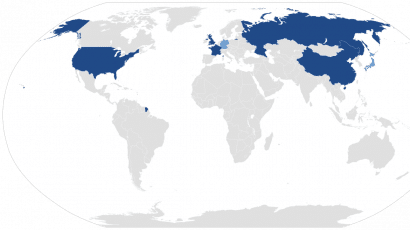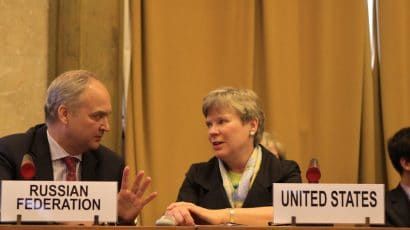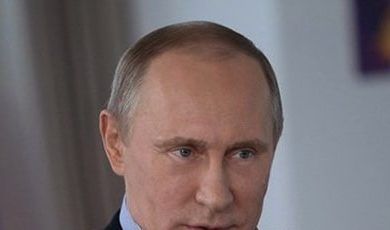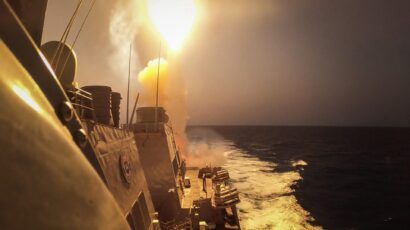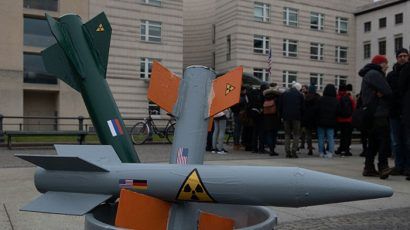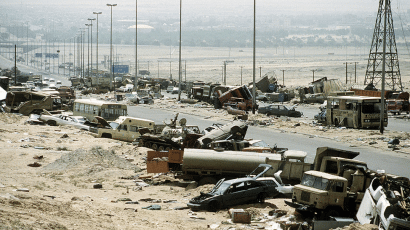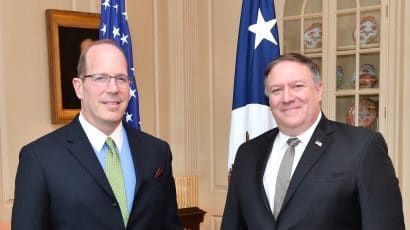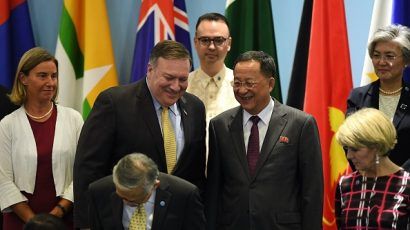Search results for nuclear terrorism
Why Biden should abandon the great power competition narrative
Aside from a quick extension of the New START treaty, one important step the Biden administration should consider in the realm of nuclear policy is to jettison the “great power competition” narrative that Trump officials and supporters have popularized.
Legal aspects of Russia’s New START suspension provide opportunities for US policy makers
US consideration of how to respond to Russia’s actions must bear in mind the potential future cost of losing New START and reemphasizing nuclear weapons in the national budget above domestic priorities. Simply put, the United States, in support of its own interests, should take every reasonable step to keep a pathway open to resuming the full implementation of New START.
Israel and the WMD-free zone: Has Israel closed the door?
Last week, Israel's influential paper, Haaretz, led its front page with a rather decisive headline: "Israel rejects US-backed Arab plan for conference on nuclear-free Mideast." The problem, however, is that the country announced no such decision.
The Trident Dispatches No. 3: Tony Blair’s forgetfulness
Two years ago, in an almost simultaneous policy turnaround, British Prime Minister Tony Blair expressed his determination to develop both a further generation of nuclear weapons and a host of new nuclear power plants--ideally before he left office. Though he made his personal preference (a staunch yes) clear in both cases, he and his government promised open debate and consultations that would involve "the wider public."
A new organization for cybersecurity across the electric grid
To guard against cyber attacks on the North American electric grid, three experts recommend forming an industry-supported organization like the one created by the nuclear industry after the Three Mile Island accident.
The new abolitionists
Philip Taubman's new book, The Partnership: Five Cold Warriors and Their Quest to Ban the Bomb, recounts the story of five front-rank Cold Warriors who have become nuclear abolitionists in their old age.
The inadequate US response to a major security threat: Climate change
Over recent decades, the United States has dedicated enormous resources -- in terms of money, manpower and national credibility -- to reducing the threat posed by weapons of mass destruction, terrorism, and the global economic crisis. These commitments have been made not necessarily because the potential dangers are expected to materialize often -- many of them are low-probability risks -- but because the consequences if they do are so large as to be considered unacceptable.
Biden threatened harsh sanctions should Russia invade Ukraine. Putin may not be deterred.
US President Joe Biden threatened Russian President Vladimir Putin with harsh sanctions should Russia invades Ukraine. Sanctions can sometimes be effective, as in the early 2000s to induce Libya to give up its nuclear program or in achieving the 2015 nuclear deal with Iran. But there are serious problems with additional US sanctions on Russia, especially in the absence of multilateral diplomacy.
Steven Pinker: Real risks, undeniable progress
Harvard psychologist Steven Pinker’s most recent book, Enlightenment Now, makes a detailed, data-driven argument that the world has indeed gotten better and can get better still. But what of the catastrophic risks that nuclear war and climate change pose to human progress? Here, in conversation with Bulletin senior editor Lucien Crowder, Pinker addresses those risks—and also addresses his published, highly pointed criticisms of the Bulletin’s signature Doomsday Clock.
Helping the United Nations combat bioterrorism
The U.N. General Assembly adopted a Global Counterterrorism Strategy in September 2006 in accordance with a mandate from the 2005 World Summit and the recommendations of Secretary-General Kofi Annan in his 2006 report "Uniting Against Terrorism".
Punishing North Korea won’t work
Despite the promise of change, the Obama administration has started to address North Korea just as the Clinton and Bush administrations did--accusing it of wrongdoing and trying to punish it for its transgressions. As Pyongyang's recent nuclear test demonstrates, the crime-and-punishment approach has never worked in the past and it won't work now. Instead, sustained diplomatic give-and-take is the only way to stop future North Korean nuclear and missile tests and convince it to halt its nuclear program.
Crisis management: A good lesson to learn?
Last month three terror attacks once again struck Mumbai, killing approximately 25 people. The attacks turned out to be the doing of an India-based Islamist outfit, the Indian Mujahedeen, and did not involve Pakistan-based Islamist militants.
In the media coverage since, terrorism experts on South Asia have posited that this attack was not a decisive shift in Islamist terrorism in India -- their argument, instead, was that Pakistan-based militants, increasingly autonomous in their operations, still remain the most likely source of a large-scale attack on Indian soil.
Doomsday Clock Symposium to be held November 29th in Washington, DC
The focus of the 4th Doomsday Clock Symposium is: managing risks of dangerous technologies. Our purpose is to explore the idea of risk, its meanings, and how individuals, the public, and policy leaders think about the risk of catastrophe from low probability events such as nuclear war, terrorist attacks, the release of lethal pathogens, and the weather-related consequences of climate change.
An Interview with Pavel Podvig
How have U.S.-Russian relations changed in the post-Cold War era?
Not as much as they should have changed. The Cold War confrontation had ideological and historic roots that are irrelevant today for either Russia or the United States. Unfortunately, however, the inertia of the Cold War has proved difficult to overcome, and the notion that nuclear weapons somehow contribute to national security persists.
Houthi attacks from Yemen show need for controls on advanced missile technology proliferation
Yemen's Houthis have exploited a trade loophole to build the missiles now threatening the Red Sea. Other groups could follow.
An ambitious arms control agenda requires a new organization equal to the task
An exceedingly challenging agenda of urgent, important, and diverse arms control issues awaits the incoming Biden administration. To address it, the administration should consider the creation of a new agency to focus on cooperative threat reduction.
War and the environment: The disturbing and under-researched legacy of depleted uranium weapons
There has been a lack of research and education into the effects of depleted uranium munitions on post-conflict communities in Iraq and Syria, and cleanup efforts by both UN member countries and affected communities have failed.
Trump appointee wants “arms control for adults.” Experts couldn’t agree more.
Not only do many of Chris Ford’s critiques fall flat, they would also be better directed at the very administration he serves.
Donald Trump and Kim Jong-un need the European Union
US-North Korea negotiations are stuck. Trump should deploy the European Union.

